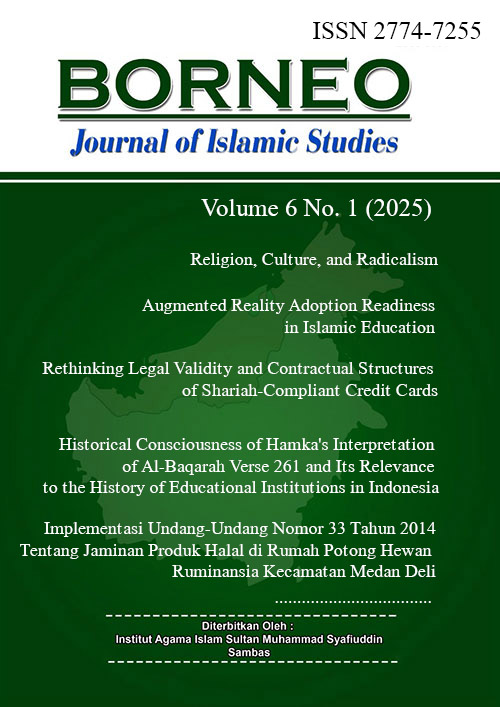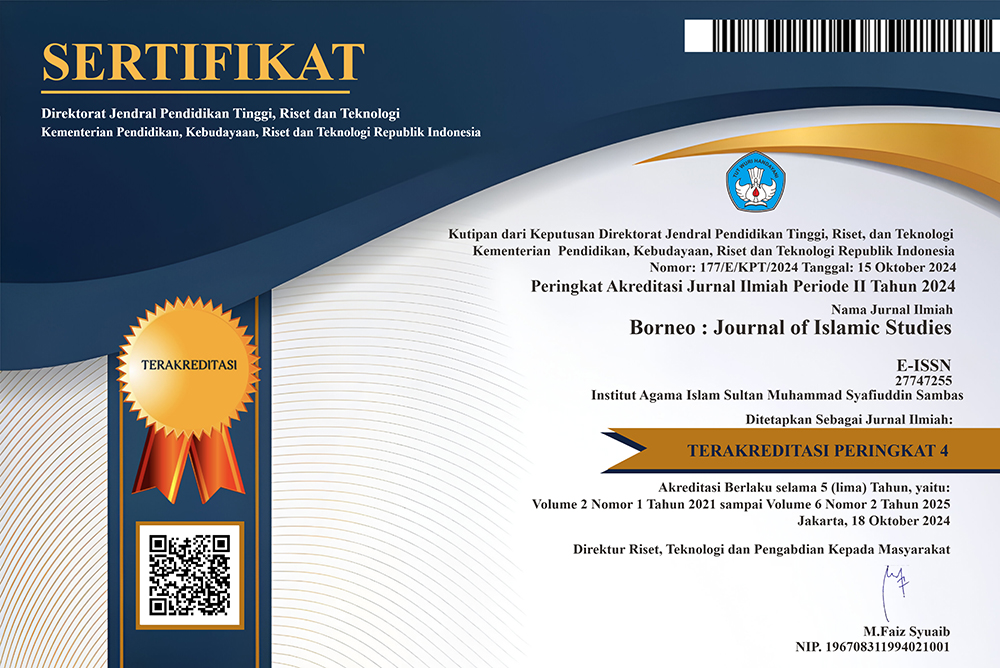Rethinking Legal Validity and Contractual Structures of Shariah-Compliant Credit Cards
A Study on DSN-MUI Fatwa
Abstract
The rapid evolution of Islamic financial products has raised critical questions about the legal validity and practical enforceability of Sharia credit cards within Indonesia’s dual legal system. This study seeks to rethink the legal validity of Sharia credit cards by moving beyond the fiqh-based legitimacy of Fatwa No. 54/DSN-MUI/X/2006 to examine their implementation under Indonesia’s positive law, regulatory oversight, and the objectives of maqāṣid al-sharī‘ah. Employing a qualitative legal content analysis, the research identifies six potentially relevant contracts kafālah, wakālah, ḥawālah, murābaḥah, qardh, and ijārah and critically assesses why the DSN-MUI ultimately operationalized only three: qardh, kafālah, and ijārah. The study argues that this tri-contract structure provides normative coherence but remains legally contingent on its harmonization with the Otoritas Jasa Keuangan (OJK) and Bank Indonesia (BI) regulations governing multi-contract products. Findings reveal that while the fatwa aligns with maqāṣid al-sharī‘ah protecting wealth (ḥifẓ al-māl) and promoting justice (‘adl) by eliminating riba its enforceability under civil contract law, particularly regarding ta‘wīḍ (compensation) and gharāmah (late penalty), remains ambiguous. Comparative insights from Malaysia and the Middle East underscore the need for a regulatory framework that integrates fatwa-based legality within codified financial law. Consequently, this “rethinking” offers a new analytical framework normative, structural, and positive legal validity to bridge the gap between Sharī‘ah doctrine and enforceable Islamic financial governance in Indonesia.
References
Abadi, M. K. N., Shlaymoon, N. S., & Albusharbe, M. (2022). Sharia Mudharaba finance in Islamic banks: between reality and practice. Res Militaris, 12(2).
Abasimel, N. A. (2023). Islamic Banking and Economics: Concepts and Instruments, Features, Advantages, Differences from Conventional Banks, and Contributions to Economic Growth. Journal of the Knowledge Economy, 14(2). https://doi.org/10.1007/s13132-022-00940-z
Addieningrum, F. M., & Aslina, N. (2021). Jual Beli Menggunakan Kartu Kredit Menurut Perspektif Hukum Islam. Jurnal STAI Hukum Ekonomi Syari’ah, XVI(1).
Ahmad Ifham Solihin. (2008). Bank Syari’ah. PT Grafindio Media Pratama.
Alkhan, A. M., Hassan, M. K., & Hasan, R. (2020). CONCEPTUALISING ISLAMIC CREDIT CARDS BASED ON MUSHĀRAKA MUTANĀQISA. Journal of Islamic Monetary Economics and Finance, 6(4). https://doi.org/10.21098/jimf.v6i4.1257
Amran, N. H., Ahmad, W., & Ho, C. S. F. (2023). Impact of Islamic Financial Markets on Economic Growth: Evidence from the Middle East and Asia. Management and Accounting Review, 22(3).
Anggela Septiani dan Husni, & Thamrin. (2021). URGENSI EKONOMI SYARIAH DALAM MENGHADAPI EKONOMI GLOBAL. Jurnal Inovasi Penelitian, 2(7).
Arsyianti, L. D., & Adelia. (2019). SHARIA-COMPLIANT CREDIT CARD EXPOSURE AND UTILISATION IN THE GROWING DIGITAL ECONOMY. Journal of Islamic Monetary Economics and Finance, 5(4). https://doi.org/10.21098/jimf.v5i4.1138
Azizah, W., & Farid, M. (2021). Manajemen Risiko dalam Perbankan Syariah. Muhasabatuna : Jurnal Akuntansi Syariah, 3(2). https://doi.org/10.54471/muhasabatuna.v3i2.1184
Bathusha, M. M., & Isa, M. Y. (2025). ISLAMIC CREDIT CARD : RECENT DEVELOPMENT FROM A SHARIAH PERSPECTIVE. 10(41), 605–624. https://doi.org/10.35631/IJLGC.1041039
Carruthers, B. G. (2009). Trust and credit. In Whom can we trust?: How groups, networks, and institutions make trust possible. https://doi.org/10.2307/j.ctv2fwfzsv.5
Cherif, A., Badhib, A., Ammar, H., Alshehri, S., Kalkatawi, M., & Imine, A. (2023). Credit card fraud detection in the era of disruptive technologies: A systematic review. In Journal of King Saud University - Computer and Information Sciences (Vol. 35, Issue 1). https://doi.org/10.1016/j.jksuci.2022.11.008
Creswell, J. W., & Creswell, J. D. (2022). Research Design: Qualitative, Quantitative, and Mixed Methods Approaches 6th edition - John W. Creswell, J. David Creswell - SAGE. In SAGE Publications, Inc.
Ezzerouali, Souad Ahmed, and A. M. S. (2024). “The right of the tenant to compensate for emptying in shops in accordance with the provisions of the Moroccan Commercial Rental Law No. 49.16.” AL-ANBAR University Journal of Law and Political Sciences, 14(1).
Fadel, M., Mukhtar Lutfi, Nasrullah Bin Sapa, & Nurjannah. (2023). Konsep Maslahah pada Produk Perbankan Sharia Card. Mutanaqishah: Journal of Islamic Banking, 2(2). https://doi.org/10.54045/mutanaqishah.v2i2.377
Gündüz, S. (2020). Development and promotion oof Islamic banking system and its role in the global banking sector. Universidad y Sociedad, 12(2).
Hadi, S., Hafidudhin, D., & Tanjung, H. (2018). Comparison of Conventional Systems Credit Card and Credit Card Shariah as Alternative Construction Credit Card on Banking System. Jurnal Manajemen, 8(1). https://doi.org/10.32832/jm-uika.v8i1.733
HAKIZIMANA, S., Makau Charity Wairimu, M.-, & Stephen, M. (2023). Digital Banking Transformation and Performance-Where Do We Stand? International Journal of Management Research and Emerging Sciences, 13(1). https://doi.org/10.56536/ijmres.v13i1.404
Haney, B. S. (2019). Blockchain: Post-Quantum Security & Legal Economics. SSRN Electronic Journal. https://doi.org/10.2139/ssrn.3444695
Hardekopf, B. (2010). The History of Credit Cards. Business Credit., Vol. 112(Issue 5).
Hardiansyah, I. W. (2021). Kartu Kredit Syariah: Perspektif Hukum Islam. AL-Muqayyad, 4(1). https://doi.org/10.46963/jam.v4i1.213
Huda, R. (2019). AKAD CONSTRUCTION ON CREDIT CARD PRODUCTS (ANALYSIS OF SHARIA ECONOMIC LAWS). Syariah: Jurnal Hukum Dan Pemikiran, 19(1). https://doi.org/10.18592/sjhp.v19i1.2041
Husni, A. (2023). SHARIA ISSUES IN ISLAMIC CREDIT CARD BASED ON INDONESIA PRACTICE. JISRAH: Jurnal Integrasi Ilmu Syariah, 4(2). https://doi.org/10.31958/jisrah.v4i2.10322
Husni, Z. M. (2020). PENGGUNAAN FASILITAS KARTU KREDIT DI PERBANKAN DALAM PERSPEKTIF ISLAM. Al Qodiri: Jurnal Pendidikan, Sosial Dan Keagamaan, 18(2).
I Muhammad, N., Yetty, Y., Suar, A., & Zainuddin, Z. (2024). Driving Factors Behind the Issuance and Use of Islamic Credit Cards in Indonesia: The Role of Consumerism. Owner, 8(4), 4729–4788. https://doi.org/10.33395/owner.v8i4.2409
Jamshidi, D., & Rezaei, A. (2012). Islamic credit card adoption: A conceptual framework. Australian Journal of Basic and Applied Sciences, 6(10).
Khairudin, Baihaqi, Y., Zaelani, A. Q., Hafiz, L., Enizar, & Fahlevy, M. R. (2024). Cyber Security and Legal Protection for Dropshipping Transactions in Indonesia: between State Law and Islamic Law. Juris: Jurnal Ilmiah Syariah, 23(1), 81–92. https://doi.org/10.31958/juris.v23i1.11786
Khalidin, B., Musa, A., & Kiawan, A. (2023). MURABAHA FINANCING OF THE INDONESIAN ISLAMIC BANKS UNDER AN ISLAMIC ECONOMIC LAW AND THE FATWA DSN MUI. Petita: Jurnal Kajian Ilmu Hukum Dan Syariah, 8(2). https://doi.org/10.22373/petita.v8i2.238
Maksum, M., & Hidayah, N. (2023). The Mechanism of Avoiding Riba in Islamic Financial Institutions: Experiences of Indonesia and Malaysia. Juris: Jurnal Ilmiah Syariah, 22(2). https://doi.org/10.31958/juris.v22i2.6952
Marlina, R. (2024). Study of the Differentiation of Conventional Credit Card and Sharia Card Products in Sharia Banks. ITQAN: Journal of Islamic Economics, Management, and Finance, 3(1). https://doi.org/10.57053/itqan.v3i1.31
Marsela, D. (2022). Online Credit Judgin From Sharia Economic Law. MILRev: Metro Islamic Law Review, 1(1). https://doi.org/10.32332/milrev.v1i1.6187
Masyhudi, H. (2018). Akad-Akad Dalam Kartu Kredit Syariah Perspektif Hukum Islam. Miyah, 14.
Miles A. Michael; and Saldana, Johnny, M. B. huberman. (2017). Qualitative Data Analysis, A Methods Sourcebook. In Jurnal Sains dan Seni ITS (Vol. 6, Issue 1, pp. 51–66). http://repositorio.unan.edu.ni/2986/1/5624.pdf%0Ahttp://fiskal.kemenkeu.go.id/ejournal%0Ahttp://dx.doi.org/10.1016/j.cirp.2016.06.001%0Ahttp://dx.doi.org/10.1016/j.powtec.2016.12.055%0Ahttps://doi.org/10.1016/j.ijfatigue.2019.02.006%0Ahttps://doi.org/10.1
Mohd Dali, N. R. S., Yousafzai, S., & Hamid, H. A. (2015). Credit cards preferences of islamic and conventional credit card. Journal of Islamic Marketing, 6(1). https://doi.org/10.1108/JIMA-05-2013-0039
Muliani, D. A., Suriani, S., & Seftarita, C. (2022). Determinants of Islamic Banks’ Net Income in Middle Eastern Countries. Share: Jurnal Ekonomi Dan Keuangan Islam, 11(2). https://doi.org/10.22373/share.v11i2.15054
Nordin, N., Samsuddin, N. A. A., Embong, R., Ahmad, A. A., Usop, R., Ismail, S. K., & Ismail, S. (2022). Developing Business Model Based on Islamic Classical Economic Thoughts. Academic Journal of Interdisciplinary Studies, 11(4). https://doi.org/10.36941/ajis-2022-0105
Norman, E. (2020a). Syari’ah Card (Kartu Kredit Syariah) Ditinjau dari Maqashid Syari’ah dan Asas Manfaat. Al-Kharaj : Jurnal Ekonomi, Keuangan & Bisnis Syariah, 2(2). https://doi.org/10.47467/alkharaj.v2i2.113
Norman, E. (2020b). SYARI’AH CARD (KARTU KREDIT SYARIAH) DITINJAU DARI MAQASHID SYARI’AH DAN ASAS MANFAAT. Al-Kharaj : Jurnal Ekonomi, Keuangan & Bisnis Syariah, 2(2). https://doi.org/10.47467/alkharaj.v2i4.113
Nugroho, E. R. (2021). IMPLEMENTATION OF SHARIA-COMPLIANCE IN ISLAMIC BANK PRODUCT INNOVATIONS. Prophetic Law Review, 3(2). https://doi.org/10.20885/PLR.vol3.iss2.art4
Nurjaman, M. I., & Witro, D. (2021). TRANSFORMASI AKAD TABARRU’ MENJADI AKAD MU’AWADHAT; ANALISIS AKAD HIWALAH DAN AKAD KAFALAH DI LEMBAGA KEUANGAN SYARIAH. Al-Mustashfa: Jurnal Penelitian Hukum Ekonomi Syariah, 6(2). https://doi.org/10.24235/jm.v6i2.8748
Panjwani, D. K., & Shili, D. N. (2020). The Impact of Fintech on Development of Islamic Banking Sector in the Contemporary World. Saudi Journal of Economics and Finance, 4(7). https://doi.org/10.36348/sjef.2020.v04i07.006
Purnomo, A., Sumbulah, U., Salam, N., & Hulwanullah, H. (2023). Characteristics of Hate Speech and Freedom of Expression in the Perspective of Maqāṣid Al-Sharī’ah. Juris: Jurnal Ilmiah Syariah, 22(1). https://doi.org/10.31958/juris.v22i1.9446
Purnomo, R., Syarifah, M., & Hodri, A. M. (2018). Analisis Komparatif Bank Syariah dan Bank Konvensional di Indonesia. Maliyah : Jurnal Hukum Bisnis Islam, 8(1). https://doi.org/10.15642/maliyah.2018.8.1.65-95
Raharjo, U., & Kristiyanto, S. (2019). Sharia Credit Card, Rules and Reality. Economie: Jurnal Ilmu Ekonomi, 1(1). https://doi.org/10.30742/economie.v1i1.821
Rusmita, S. A., & Ajija, S. R. (2017). Attitudes of Consumers Towards Islamic and Conventional Credit Cards in Indonesia. ETIKONOMI, 16(2). https://doi.org/10.15408/etk.v16i2.5519
Salsabila, Sekar Salma, P. (2019). EKSISTENSI KARTU KREDIT DENGAN ADANYA ELECTRONIC MONEY (E-MONEY) SEBAGAI ALAT PEMBAYARAN YANG SAH. Jurnal Privat Law, 7(1). https://doi.org/10.20961/privat.v7i1.30092
Tina Marlina, Ismayana, D. H. (2021). ASPEK HUKUM DAN PENYELESAIAN ATAS TRANSAKSI PEMBAYARAN JUAL BELI MENGGUNAKAN KARTU ELEKTRONIK. JURNAL HUKUM DAN DINAMIKA MASYARAKAT, 19(1).
Utsmani, M. M. (2017). CREDIT CARD PERSPEKTIF HUKUM ISLAM. WADIAH, 1(2). https://doi.org/10.30762/wadiah.v1i2.1282
Waid, A., & Lestari, N. (2020). TEORI MAQASHID AL-SYARI’AH KONTEMPORER DALAM HUKUM ISLAM DAN RELEVANSINYA DENGAN PEMBANGUNAN EKONOMI NASIONAL. JURNAL LABATILA, 4(01). https://doi.org/10.33507/lab.v4i01.270
Witro, D., Zufriani, Z., Arzam, A., & Nurjaman, M. I. (2022). ANALISIS IMPLEMENTASI AKAD IJARAH DI PERBANKAN SYARIAH BERDASARKAN REGULASI DAN FATWA. Asy-Syari’ah, 23(2). https://doi.org/10.15575/as.v23i2.14141
Yusuf Prasetiawan, A., & Erlina, F. (2023). IMPLEMENTASI BAI` AL-INAH DAN KAFALAH-IJARAH DALAM SYARIAH CHARGE CARD. Jurnal Ekonomi Syariah Darussalam, 4(1). https://doi.org/10.30739/jesdar.v4i1.1846
Copyright (c) 2025 Muhammad Adib Alfarisi, Suhedi Suhedi, Souad Ahmed Ezzerouali, Dyah Andrianti

This work is licensed under a Creative Commons Attribution-ShareAlike 4.0 International License.








.png)



